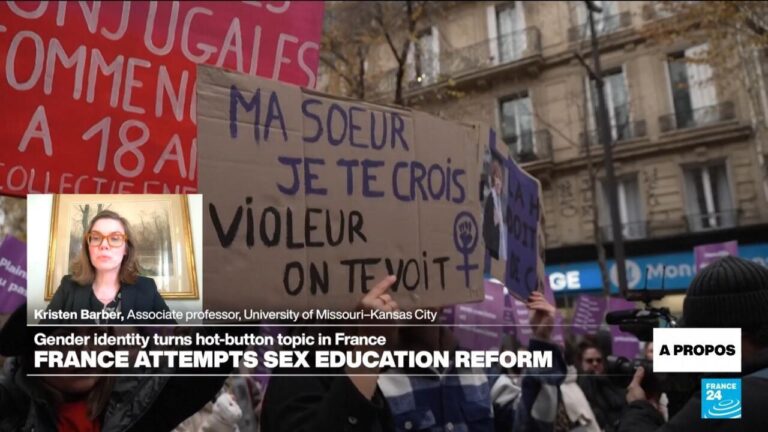France is witnessing a heated debate as proposals to reform sex education in schools bring the issue of gender identity to the forefront. The government’s push to update curricula aims to promote inclusivity and awareness, but has sparked controversy among parents, educators, and political groups. As discussions intensify, the question of how gender identity is addressed in the classroom has become a flashpoint in broader cultural and political divides across the country.
Gender Identity Sparks Intense Debate Amidst France’s Sex Education Overhaul
The current overhaul of France’s sex education curriculum has ignited fierce controversy, focusing particularly on the inclusion of gender identity topics. Advocates argue that introducing comprehensive lessons on gender diversity is essential to fostering inclusivity and combating discrimination from an early age. However, conservative groups and some parents vehemently oppose these changes, claiming they undermine traditional family values and confuse children about their identity. The debate has quickly transcended classrooms, permeating political discourse and social media platforms, where opinions remain sharply divided.
Education experts and policymakers are caught in a balancing act, striving to respect cultural sensitivities while ensuring that young people receive accurate and progressive information. Key points of contention include:
- Age-appropriate content: Determining the right age to introduce discussions on gender fluidity.
- Teacher training: Preparing educators to handle sensitive topics with professionalism and empathy.
- Parental rights: Navigating the interface between state mandates and family preferences.
| Stakeholder | Main Concern | Proposed Solution |
|---|---|---|
| Parents | Impact on child’s development | Optional opt-out clauses |
| Teachers | Insufficient training | Specialized workshops and resources |
| Lawmakers | Political backlash | Incremental rollout of reforms |
Diverse Perspectives Shape the Future of School Curricula on Gender and Sexuality
As France embarks on a contentious journey to reform sex education, the debate reveals a tapestry of perspectives influencing how gender and sexuality are taught in schools. Advocates for comprehensive curricula argue that inclusive education is essential for fostering understanding and respect among young people. They emphasize the importance of addressing not only biological aspects but also the diverse realities of gender identity and sexual orientation. These proponents highlight initiatives such as:
- Workshops led by LGBTQ+ organizations to provide authentic voices in classrooms
- Age-appropriate modules tailored to increase awareness without causing confusion
- Training programs for educators to handle sensitive topics with empathy and accuracy
Conversely, critics raise concerns about cultural values and parental rights, arguing that rapid changes risk undermining traditional family structures and moral teachings. This divergence has sparked heated discussions in legislative chambers and public forums alike, forcing policymakers to weigh educational benefits against societal apprehensions carefully. The split in public sentiment is reflected in recent opinion polls:
| Public Opinion | Support (%) | Oppose (%) | Undecided (%) |
|---|---|---|---|
| Inclusive Gender Education | 48 | 37 | 15 |
| Traditional Sex Education | 39 | 49 | 12 |
Balancing Tradition and Progress in France’s Approach to Gender Identity Education
France stands at a crossroads as it seeks to reshape its sex education curriculum, aiming to incorporate comprehensive discussions on gender identity while respecting the country’s strong cultural and religious traditions. The effort highlights a delicate balance between advancing progressive values and addressing the concerns of conservative communities, many of whom fear that the reforms might undermine traditional family structures. Education officials argue that an inclusive approach is essential for fostering respect and understanding among younger generations, equipping them to navigate a diverse and evolving society.
Key challenges and perspectives include:
- Resistance from certain parent groups: Concerned about age-appropriate content and the perceived politicization of education.
- Support from human rights advocates: Emphasizing the importance of acknowledging diverse gender identities to combat discrimination.
- Government initiatives: Introducing updated materials and teacher training to ensure informed and sensitive delivery.
- Religious institutions: Advocating for respect towards moral values while engaging in dialogue with policymakers.
| Stakeholder | Primary Concern | Proposed Solution |
|---|---|---|
| Parents | Age-appropriate content | Clear guidelines and opt-out options |
| Educators | Teacher preparedness | Enhanced professional training |
| Activists | Inclusive representation | Curriculum diversification |
| Religious groups | Preservation of values | Dialogue and compromise |
Experts Call for Inclusive Policies and Comprehensive Teacher Training
As debates intensify around the contentious overhaul of sex education in France, educators and specialists emphasize the urgent need for policies that embrace diversity and foster understanding among all students. They argue that without inclusive frameworks, schools risk alienating those who identify outside traditional gender norms. Central to these calls is the demand for comprehensive teacher training programs, designed to equip educators with the knowledge and sensitivity required to handle complex topics related to gender identity, sexual orientation, and personal expression.
Experts highlight key components necessary for effective reform:
- Inclusive curriculum materials representing diverse gender identities
- Mandatory sensitivity and awareness workshops for teachers
- Ongoing support systems for both students and staff
- Collaboration with advocacy groups and mental health professionals
| Policy Aspect | Proposed Measure | Expected Outcome |
|---|---|---|
| Teacher Training | Mandatory annual workshops | Enhanced educator competence and sensitivity |
| Curriculum Content | Inclusion of gender diversity studies | Promotes student empathy and acceptance |
| Support Systems | Peer support groups in schools | Better student mental health and inclusion |
Future Outlook
As France navigates the complexities of modernizing its sex education curriculum, the debate over gender identity has emerged as a focal point of national discourse. The government’s efforts to address inclusivity and diversity in schools have sparked intense discussions among educators, parents, and political leaders alike. As this contentious issue continues to unfold, how France balances evolving social values with educational policy will be closely watched, reflecting broader global conversations on identity, rights, and the role of education in shaping future generations.




